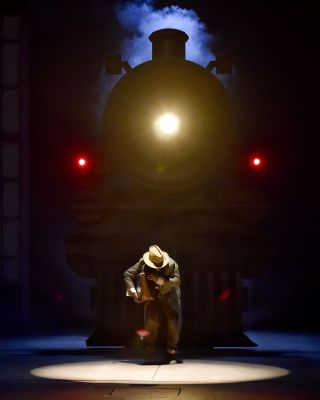Suicide
Can a Bad Boy Ever be a Good Role Model?
The Stagger Lee story highlights the psychological complexity of a bad boy hero
Posted January 30, 2015

As I read Stagolee Shot Billy by Cecil Brown, ideas exploded in my brain like a palm slap to my forehead. No wonder we have such an issue with race in our country. No wonder the gangsta-like male is upheld as a hero. For a long time in the United States, men like Stagger were the heroes, the only forceful masculine presence in a country that was pitted against them. Shelton Lee, the man from

whom the mythical Stagger Lee emerged, was a gambler, a pimp, and a murderer. But in the United States post-Civil War culture, he protected his people. Like Dirty Harry, Michael Corleone, or James Bond, Stagger was a good-guy bad-boy. I read about Stagger Lee in preparation for the Dallas Theater Center world premiere musical Stagger Lee, which opens in Dallas tonight. Stagger Lee’s story reverberates in songs from blues to jazz to rap to hip-hop. Staggolee broke the rules to make things right.
What happens, however, when the rebel needs to give way to a different kind of hero? I ask this because of a disturbing statistic. Today in the United States, homicide is the highest cause of death for black men aged 15-35, followed by accidents, and then suicide. If heroes continue to be criminals after society has transformed its laws, do these heroes only serve to ensnare the next generation in chains of the past?
I discovered the stats regarding black homicide a few years ago when I was studying the Centers for Disease Control and Prevention (CDC) numbers for youth suicide. The latest numbers produced by the CDC show that trends have not changed. Suicide is often counted as the third highest cause of death for 15 to 35 year olds in our country, with homicide as number two. This high homicide figure didn’t seem right to me, so I dove deeper into the numbers. Black males in this age group die by homicide in such high numbers that they throw off the stats for the general population. If black males are removed out of the general-population numbers for this age group, suicide is the second highest cause of death. Unfortunately, black males die by suicide at a rate equal to their same-aged white counter parts. Between homicide and suicide, a young black male is practically an endangered person.
Although I understand why names like Trayvon Martin, Michael Brown and Eric Garner spur protests, angry slurs and violence by some members of the black community, the problem is far larger than white cops killing black men.
Some young black men feel disenfranchised by the unjust, unwritten rules and prejudice of society, so they adopt a Stagger-like mentality. They break the rules, which sets off an unending Catch 22. They break rules out of anger and frustration of being locked out of opportunity and land in trouble. This cements prejudice and stereotypes, which keeps them locked out of society. Sometimes anger, no matter how just, can keep a person locked in a problem forever.
At some point in healing, a person must acknowledge the past, realize the impact of the past and release the past’s grip in order to move forward. I see this in older forms of psychology all the time. People encounter a trauma and are forced to repeat trauma over and over again, without constructive progress. Luckily newer versions of psychology like Rational Emotive Behavior Therapy (Albert Ellis), Cognitive Behavior Therapy (Aaron Beck) and Dialectic Behavior Therapy (Marsha Linehan) avoid this trap of being stuck in a past trauma. All of these methods acknowledge the past, but focus on tactics of avoiding future destructive behavior. If the past continues to dictate future behavior, the past always wins.
The important fact is this, as so eloquently stated by Emmett Fox: “What you think about grows.” If a person focuses solely on injustice and past wrongs while magnifying the wrongs of the present, s/he will be stuck. The bright spots of opportunity, usually not easily accessible, become impossibilities.
Rebellion is critical to battle injustice, but when do the rebels give way to leaders that build a culture which sustains and grows its own people? Nelson Mandela understood this, as did Martin Luther King. These leaders lack the swagger and the style of Stagger Lee, but their strength created lasting, positive change. I know men like this exist; I have seen them and worked alongside them. Unfortunately, their good works often lack the flash and glamor that hold the spotlight. I hope these men are not discouraged by the noisy few of every color, who are so eager to scream their opinions, but do so little to create real change.
Slow and steady wins the race, day by day, thought by thought. The bold faith necessary to create a new culture requires more bravery than just breaking an old one. Bold, quiet, steady faith. That’s a song that’s yet to find its rhythm in a world that likes things fast and loud.

“Stagger Lee,” produced by the Dallas Theater Center, opens 1/30/15 at the Wyly Theater. Come Early and Stay Late discussions are held before and after every show. Tickets may be ordered by calling the box office: 214-880-0202 or through this link: https://www.dallastheatercenter.org/show_details.php?sid=95
For more information about Julie K. Hersh, Struck by Living or Decidí Vivir, go to the Stuck by Living website. http://www.struckbyliving.com/




